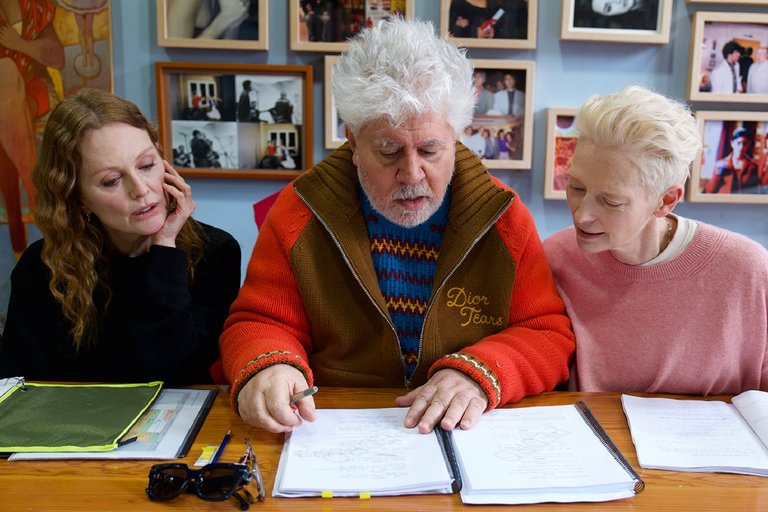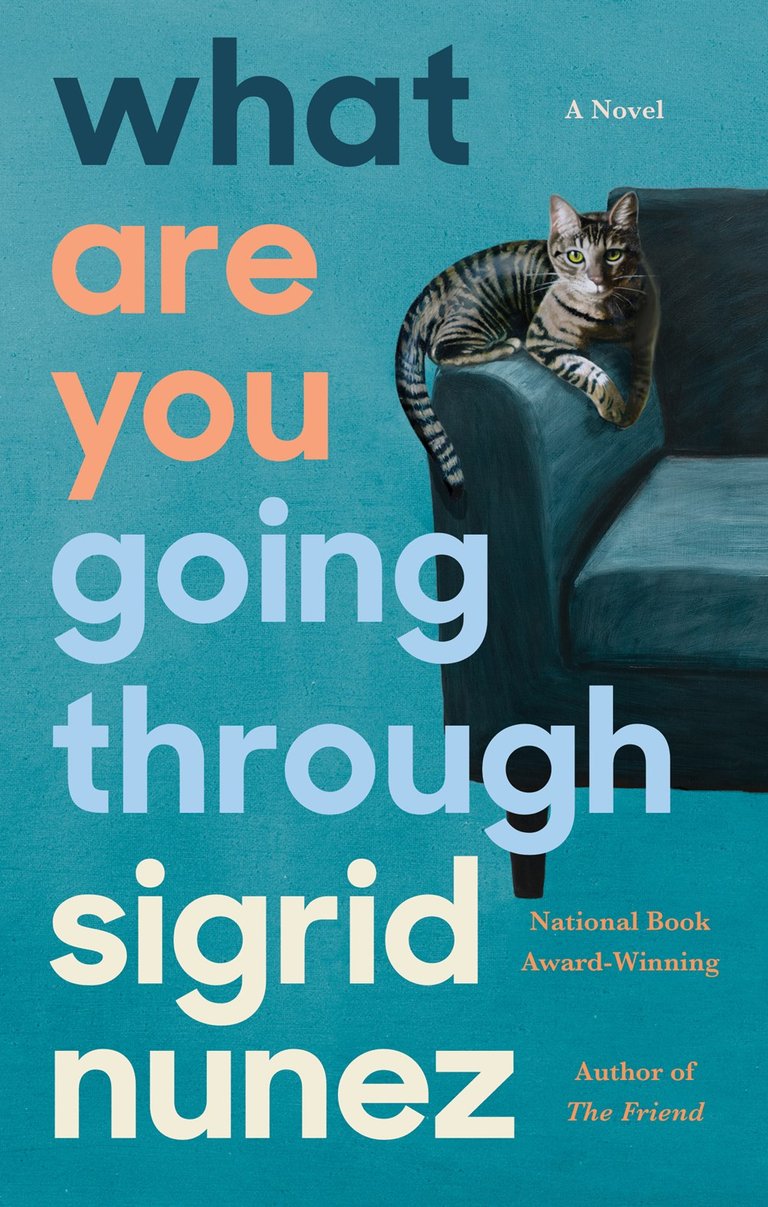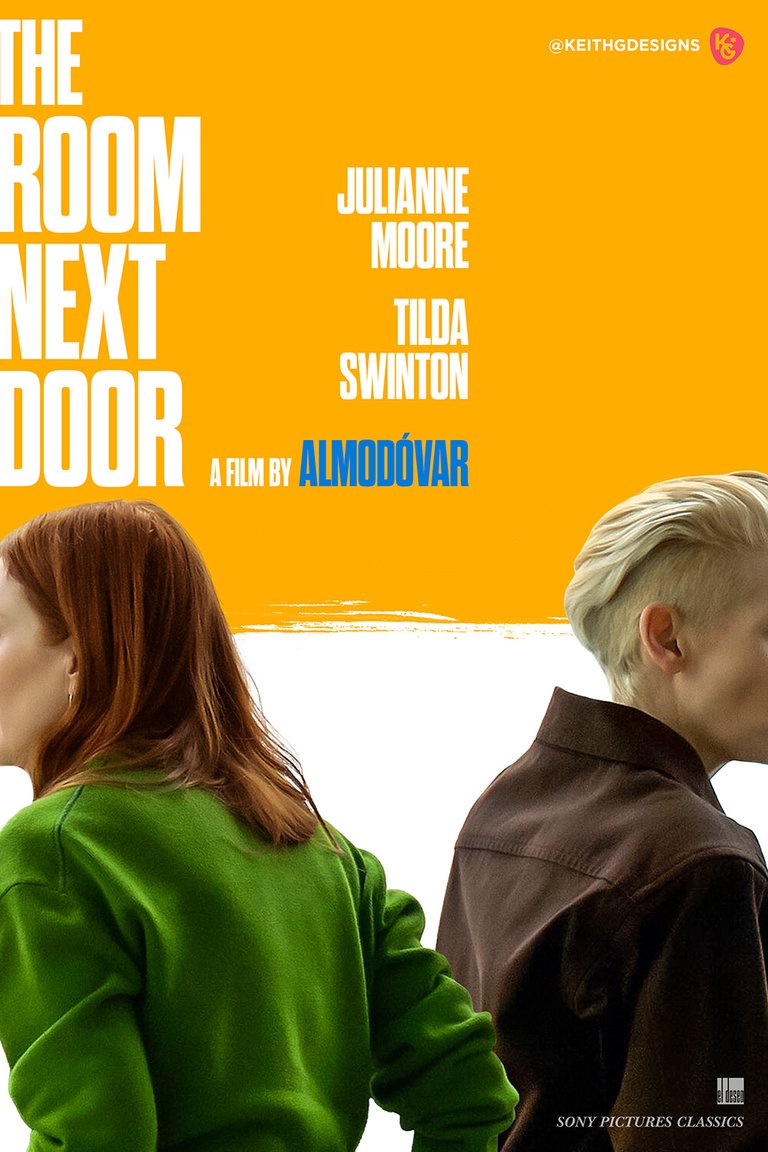
Si alguien te pidiera este favor, ¿lo harías?
Pedro Almodóvar is one of the most recognized Spanish directors in the world. He has been nominated many times, has won important awards (Oscars, Golden Globes, Goyas), has collaborated several times with Penélope Cruz and Antonio Banderas, but above all he has known how to captivate and surprise the public with films like Pain and Glory, Volver, Hable con ella, the thriller The Skin I Live In and the already iconic All About My Mother. So any film that this director releases is going to attract the attention of the media and the public.
Pedro Almodóvar es uno de los directores españoles más reconocidos en el mundo. Ha sido nominado muchas veces, ha ganado premios importantes (Oscars, Golden Globes, Goyas), ha colaborado varias veces con Penélope Cruz y Antonio Banderas, pero sobre todo ha sabido cautivar y sorprender al público con películas de entre las cuales destacan Dolor y Gloria, Volver, Hable con ella, el thriller La piel que habito y la ya icónica Todo sobre mi madre. Así que cualquier película que estrene este director va a acaparar la atención de los medios y del público.
Let's add to that that this time, unlike most of his notable works, Almodóvar has decided to film an English-speaking film in its entirety (it's the first time for this director) and that he has obtained a luxury leading duo: Julianne Moore and Tilda Swinton. That was enough for me to want to see this movie and go to the theater without having seen any trailer or read any reviews (someone had told me that the movie was based on a book, but didn't tell me the story). The Room Next Door begins with the story of Ingrid (Moore) and Martha (Swinton), who were very close during their youth, but whose lives took them on paths far from each other although slightly related. One became a writer and the other a war correspondent in the style of Ryszard Kapuściński. The old friends collaborated with the same magazine, but adult life, marriages, children, jobs, responsibilities and other things caused them to lose contact and not speak for many years. Until one day Martha looks for Ingrid to make a particular request. Depending on the approach one gives it, it can be a sad, depressing, extreme situation without a doubt, but it can also be seen with a certain sweetness due to the vulnerability contained in the request to accompany someone in death.
Sumemos a eso que esta vez, a diferencia de la mayoría de sus obras notables, Almodóvar ha decidido filmar una película de habla inglesa en su totalidad (es la primera vez para este director) y que ha conseguido una dupla protagonista de lujo: Julianne Moore y Tilda Swinton. Eso fue suficiente para que yo quisiera ver esta película y acudiera al cine sin haber visto ningún avance ni leído ninguna reseña (alguien me había dicho que la película se basaba en un libro, pero no me contó la historia). The Room Next Door comienza con la historia de Ingrid (Moore) y Martha (Swinton), quienes fueron muy cercanas durante su juventud, pero cuyas vidas las llevaron por caminos lejanos entre sí aunque ligeramente relacionados. Una se convirtió en escritora y la otra en corresponsal de guerra al mejor estilo de Ryszard Kapuściński. Las viejas amigas colaboraron con la misma revista, pero la vida adulta, matrimonios, hijos, trabajos, responsabilidades y otras cosas hicieron que perdieron el contacto y que no hablaran durante muchísimos años. Hasta que un día Martha busca a Ingrid para hacerle una petición particular. Dependiendo del enfoque que uno le dé, puede ser una situación triste, deprimente, extrema sin duda alguna, pero también puede verse con cierta dulzura debido a la vulnerabilidad que encierra la petición de acompañar a alguien en la muerte.

Because Martha is sick. Cancer (the favorite enemy of writers and screenwriters). The disease is very advanced and she knows that she's not goinna make it, so what she wants is not to undergo the exhausting chemo sessions but die conscious, in her abilities - to the extent possible - and with what she feels is human dignity. No, she's not going to sit and wait for her death. Martha wants to choose the moment when she will leave this world and end her life by her own hand, but she asks Ingrid to be close. Very close.
Porque Martha está enferma. Cáncer (el enemigo favorito de los escritores y guionistas). La enfermedad está muy avanzada y sabe que no va a conseguirlo, entonces lo que ella desea es no someterse a las extenuantes sesiones de quimio y morir consciente, en sus capacidades - en la medida que se pueda - y con lo que siente que es cierta dignidad humana. No, no va a sentarse a esperar su muerte. Martha quiere escoger el momento en que dejará este mundo y acabar con su vida por propia mano, pero le pide a Ingrid que esté cerca. Muy cerca.
Ingrid won't have to do anything, Martha will take care of every detail. But the former war correspondent wants Ingrid to be in the next room, to be the first to know when everything has happened and to be in charge of notifying the authorities and all that. The viewer has several questions that the film answers: why Ingrid, if they hadn't seen each other for so long, why her, why not someone closer, why not just leave a suicide note, why not asking someone who is close, but not necessarily very close? And then there are other questions that are moral, philosophical and human dilemmas, does a person have the right to end their life? Euthanasia is allowed in many countries, but there's a legal procedure for it, does individual freedom prevail over paperwork and protocol? From a criminal point of view, a suicide is a murderer. The problem is that when the victim is the murderer himself you have no one to prosecute and/or convict. But, what happens when someone knows that another person is going to commit suicide and still does nothing to prevent it? does this person become an accomplice of a murder? does this person have the legal responsibility to inform? and the moral responsibility? Imagine that a friend or someone close to you asks you for what Martha is asking Ingrid, would your friendship come before everything else? would you accept? Or if you were Martha, would you ask this of someone knowing that it could have harmful consequences for that person emotionally, psychologically and even legally?
Ingrid no tendrá que hacer nada, Martha se encargará de todo. Pero la ex corresponsal de guerra quiere que Ingrid esté en la habitación de al lado, que sea la primera en enterarse cuando todo haya pasado y que se encargue de notificar a las autoridades y todo eso. Al espectador le surgen varias preguntas que la película va respondiendo: ¿por qué Ingrid? si tenían tanto tiempo sin verse, ¿por qué ella? ¿por qué no alguien más cercano? ¿por qué no dejar una nota de suicidio simplemente? ¿por qué pedir a alguien que esté cerca, pero no necesariamente muy cerca? Y luego hay otras preguntas que son dilemas morales, filosóficos y humanos, ¿tiene una persona el derecho de acabar con su vida? La eutanasia está permitida en muchos países, pero existe un procedimiento legal para ello, ¿prevalece la libertad individual por encima del papeleo y el protocolo? Desde un punto de vista criminal, un suicida es un asesino. El problema es que cuando la víctima es el mismo homicida no se tiene a nadie a quien enjuiciar y/o condenar. Pero, ¿qué pasa cuando alguien sabe que otra persona se va a suicidar y aún así no hace nada para evitarlo? ¿se convierte en cómplice de un asesinato? ¿tiene esta persona la responsabilidad legal de informar? ¿y la responsabilidad moral? Imagina que un amigo o alguien cercano te pide lo que Martha le pide a Ingrid, ¿tu amistad estaría por encima de todo lo demás? ¿aceptarías? O en caso de que fueras Martha, ¿le pedirías esto a alguien sabiendo que puede traer consecuencias perjudiciales para esa persona desde el punto de vista emocional, psicológico e incluso legal?

There are many questions that one can ask oneself in this regard and the debate is very interesting because there's always talk of the right to life and the inevitability of death. It's defended that people have the right to live with dignity, but often the desire to die with the same dignity is condemned. If a person doesn't want to die bedridden, doesn't want to fight against an incurable disease and euthanasia is not legal in the country where they live, what can they do? Is their right as a human being above the law? I don't know what you think and I am not going to tell you Ingrid's position on this so that you will be encouraged to watch the film.
Son muchas las preguntas que uno puede hacerse al respecto y muy interesante el debate porque siempre se habla del derecho a la vida y la inevitabilidad de la muerte. Se defiende que las personas tenemos derecho de vivir dignamente, pero muchas veces se condena el deseo de morir con la misma dignidad. Si una persona no quiere morir postrado en una cama, no quiere luchar contra una enfermedad incurable y en el país que reside la eutanasia no es legal, ¿qué puede hacer? ¿su derecho como ser humano está por encima de la ley? No sé qué piensen ustedes y no les voy a decir cuál es la postura de Ingrid con respecto a esto para que se animen a ver la película.
For the screenplay of The Room Next Door, Almodóvar adapted the novel What Are You Going Through by Sigrid Nunez and after having seen the film I am curious to read it. The direction of the film is very good, as is the photography; but there are moments when the plot feels like that of a book, so I'm curious to read it and see the differences, especially from the viewer's/reader's point of view. Perhaps it goes without saying, but the lead performances are incredible. Julianne Moore and Tilda Swinton are two of today's most recognizable and accomplished actresses and they portray the characters very well on an emotional and psychological level. I think they both had a big challenge playing Martha and Ingrid, but they came through with flying colors, as they have so many times before. I haven't seen recent awards galas and haven't seen nominations, but I wouldn't be surprised if The Room Next Door is considered at major events because of its performances and adapted screenplay. I think Almodovar did a very good job on this film, keeping his style, but doing something new at the same time. It feels like something very much his own, but at the same time it doesn't feel like a typical Almodóvar film at all, what do you think, have you seen The Room Next Door, do you recognize the Spanish director's style in the film, what is your favorite of his? I'll read you in the comments.
Para el guion de The Room Next Door, Almodóvar adaptó la novela What Are You Going Through de Sigrid Nunez (publicada en español por Editorial Anagrama) y después de haber visto la película me da curiosidad leerla. La dirección del film es muy buena, al igual que la fotografía; pero hay momentos en que la trama se siente como la de un libro, entonces me llama la atención leerlo y ver las diferencias, sobre todo desde la sensación del espectador/lector. Quizás sobra decirlo, pero las actuaciones protagonistas son increíbles. Julianne Moore y Tilda Swinton son dos de las actrices más reconocidas y con mayor trayectoria de la actualidad y retratan muy bien los personajes a nivel emocional y psicológico. Creo que ambas tuvieron un gran desafío al encarnar a Martha y a Ingrid, pero lo superaron con creces, como tantas otras veces. No he visto galas de premios recientes y no he visto nominaciones, pero no me sorprendería que The Room Next Door sea considerada en eventos importantes gracias a sus actuaciones y su guión adaptado. Creo que Almodóvar hizo un muy buen trabajo en esta película, manteniendo su estilo, pero haciendo algo nuevo a la vez. Es como que se siente como algo muy suyo, pero a la vez no parece del todo una típica película de Almodóvar, ¿ustedes qué piensan? ¿Ya vieron The Room Next Door?¿reconocen el estilo del director español en la película? ¿cuál es su favorita de este cineasta? Los leo en los comentarios.






